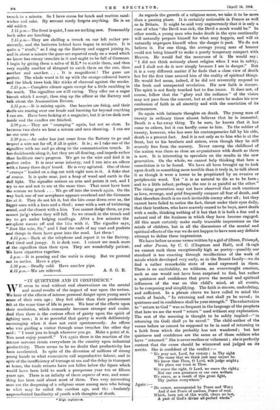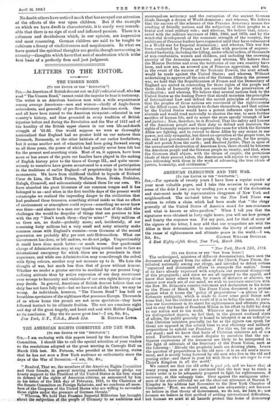"IN QUIETNESS AND IN CONFIDENCE."
WE seem to read without end observations on the mental and moral results of the impact of war upon the nation. We hear of the effects of intense personal danger upon young men's sense of their own age ; they feel older than their predecessors fait at the same time of life in peace. We hear of the effects upon their resolution, which commonly becomes stronger and cooler. And then there is the curious effect of gaiety upon the spirit of fighting men ; it is so powerful that gaiety is worth deliberately encouraging when it does not exist spontaneously. An officer who was guiding a visitor through some trenches the other day said "1 want you to laugh wherever you go. Make a point of it. You must enjoy yourself." Yet again there is the reaction of the intense nervous strain everywhere in the country upon industrial productivity. There seems to be no doubt that productivity has been accelerated. In spite of the diversion of millions of strong young hands to what economists call unproductive labour, and in spite of the insufficiency of tonnage at sea and the delay in transport at home, the trade returns have not fallen below the figure which would have been held to mark a prosperous year ten or fifteen years ago. There is an infinity of these aspects of war, and some- thing has been said about most of them. Two very interesting ones are the deepening of a religious sense among men who belong to what may be called the careless age, and th3 bsolutelY unprecedented familiarity of youth with thoughts of death.
• 1110 explosives.
As regards the growth of a religious sense, we take it to be more than a passing phase. It is certainly noticeable in France as well, as in Britain. It might be said very ungenerously that it is only a case of when "the Devil was sick, the Devil a monk would be." In
other words, a young man who looks death in the eyes continually will naturally prepare himself for what may happen, and will as naturally unprepare himself when the danger is past. We do not believe it. For one thing, the average young man of honour, could not bring himself to make a purely temporary compact with Heaven. He would feel the meanness of it. He would say : "I did not think seriously about religion when I was in safety, and I shall not do it now simply because I am in danger." But it is a very different matter if be finds that a close view of death has for the first time assured him of the reality of spiritual things. He would feel mean, indeed, if he did not reverently respond to the fresh and unexpected revelation. His new faith is sincere. The spirit is not finely touched but to fine issues. It does not, of
course, follow that the "glory and the radiance" of the vision may not pass from the convert, but at all events he makes his new confession of faith in all sincerity and with the conviction of its permanence.
So again with intimate thoughts on death. The young man of twenty in ordinary times almost believes that he is immortal.. Death is a far-away thing. To be sure, he knows that it has come to others, but it can hardly come to him. To the soldier of twenty, however, who has seen his contemporaries fall by his side, death is a present fact. And it is not only so to him who is at the front, but to his brothers and sisters, even though they be still scarcely free from the nursery. Never among the childhood of the nation was there so close an acquaintance with death as there. is now. It is interesting to speculate on the results in the new
generation. On the whole, we cannot help thinking that here a consolation is to be found. We have all been brought up to look
upon death as something more terrible than it truly is, to talk 'about it as though it were a terror to be propitiated by an evasive or periphrastic word. Yet "it is as natural to die as to be born ; and to a little infant, perhaps, the one is as painful as the other." The rising generation may not have observed that such emotions as love, revenge, and grief frequently conquer all fear of death, and that therefore death is no such invincible enemy after all ; but they. cannot have failed to notice the fact, thrust under their eyes daily, that their brothers, who have scarcely ceased to be boys, meet death with a smile, thinking nothing of it but that it is both a fine and a natural end of the business in which they have become engaged. All this must certainly make easily traceable impressions on the minds of children, but in all the discussions of the mental and spiritual effects of the war we do not happen to have seen any definite
attempt to define these impressions.
We have before us some verses written by a girl of fifteen, Triumph, and other Poems, by C. C (Chapman and Hall), and th nigh we cannot rank them exceptionally high as poetry—possibly our standard is too exacting through recollections of the work of minds which developed very early, as in the Brontii family—we do find a rather remarkable state of mind expressed in them. There is no excitability, no wildness, no overwrought emotion, such as one would not have been surprised to find, but rather a quietness and confidence that prove the mental and spiritual influences of the war on this child's mind, at all events, to be composing and simplifying. The faith is sincere, undoubting, and sufficient. In a phrase above we have called to mind the words of Isaiah, "In returning and rest shall ye be saved ; in quietness and in confidence shall be your strength." Thcexhortation to "return to God" was so frequent in the language of the prophets that here we see the word " return " used without any explanation. The rest of the meaning is thought to be safely implied—" in returning (to God) shall ye be saved." The child-author of the verses before us cannot be supposed to be in need of returning to a faith from which she probably has not wandered ; but her quietness and confidence are the same as of those soldiers who have "returned." She is never restless or vehement ; she is perfectly content that the cause should be winnowed and judged on its
merits. She is confident of the verdict :—
" We pray not, Lord, for victory ; in Thy sight The cause that we think just may unjust be. We know that Thou,, 0 Lord, wilt judge aright ; We place our trim; in Thee.
We crave the right, 0 Lord, we crave the right;
Not our own greatness or our own welfare. We crave, as a result of this great fight,
Thy justice everywhere."
Again :—
"He comes, accompanied by Peace and War ;
And if not Peace of nations, Peace of souL
_ Which, born not of this world, obeys no law, A vizi' of God's divine all-perfect whole." No doubt others have noticed much that has escaped our attention of the effects of the war upon children. But if the example on which we have dwelt is characteristic, it is surely very remark- able that there is no sign of mad and inflamed passion. There is a calmness and decidedness which, in our opinion, are impressive and most reassuring. German children are said to be taught to cultivate a frenzy of vindictiveness and megalomania. In what we have quoted the spiritual thoughts are gentle, though unwavering in atensity—thoughts which have that sort of moderation which is the best basis of a perfectly firm and just judgment.































 Previous page
Previous page